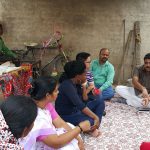
Spotlight Series
Center for Studies in Rural Development
By Ruth Samuel
For the past 11 years, Suresh Pathare, Ph.D. has served as an educator, administrator, and director of the Institute of Social Work & Research in Ahmednagar, India. Before he ascended to his current roles with the Center for Studies in Rural Development, in 2013, Dr. Pathare was earning his postdoctoral degree from the University of North Carolina at Chapel Hill. It was at UNC that he fostered a relationship with Dr. Gina Chowa and former Associate Dean Dr. Jack Richman through a five-year MOU (memorandum of understanding).
“The MOU consists of giant research projects, some exchange lectures, but also it was an opportunity for students and faculty to have a knowledge–sharing partnership,” said Pathare. “Dr. Chowa’s research areas, her interests, and the work that she was doing that time were similar to what we are doing here in India, and that is how we found that meaningful connection.”
Witnessing its 2017 launch, Pathare has been a longstanding partner of Global Social Development Innovations (GSDI) in the School of Social Work. One of the most important initiatives in progress is the Adolescent Boys and Girls Program for Gender Equity in Maharashtra, India. Founded in 2015, the program seeks to address the injustices that women and girls face by engaging male and female participants (ages 12-16) in a multi-faceted life skills training.
Pathare said, “The first part is about understanding self, identity, and how they see themselves physically. The second part is about leadership, decision–making, and managing self. There are sessions about gender, whereby, how they look at the other sex. This is basically making them also realize what is their capacity, what is their competence, what they are deprived of, and why.”
According to a 2011 census, girls in India age five or less are 75% more likely to die than their male counterparts. On average, women who marry before age 15 give birth three to seven years earlier than their peers aged 15-25 (Jensen & Thorton, 2003). Due to heightened exposure to sex, minimal access to contraception, and pressure to conceive, 90% of adolescent pregnancies in lower-resourced countries occur in girls who are married (Psaki, 2016).
Along with cultivating self-esteem and introspection, the training curriculum fosters discussion regarding the intersections of gender-based violence, reproductive health, education, and healthy relationships in achieving gender equity. Apart from funding, Dr. Pathare said that the GDSI team lent their support by co-conceptualizing the project and offering technical help.
“Putting the interventions and work into a research context was the contribution from GSDI. They brought in this scientific way of doing things, and also how we can do the impact assessment at the end and see scientifically what is happening with what we are giving. That was the important contribution,” Pathare said.
Furthermore, the GSDI team made an effort to grasp what was happening on the ground. Pathare noted that one of the biggest assets was a visit from Dr. Rainier Masa, Chowa, and Richman to the project site, which provided firsthand context and understanding as they sought to help redesign the project. Their dedication, approach, and methodology further reinforced the relationship with Pathare and partners while working with vulnerable populations.
Pathare said, “All of our work is with people who are excluded and [living in a] disadvantaged section of the society. What I found with GSDI’s whole approach is to work with people, rather than work for people. It was not working solely for the academic purpose, but also trying to see how we can bring change in the life of the people.”
After the Adolescent Boys and Girls Program for Gender Equity, Pathare and GSDI have launched a project to support rural families amidst COVID-19. Together, they are working to analyze what the pandemic’s social and economic impact is on people of lower-income groups and how it affects their livelihood and psychosocial stability. Pathare looks forward to continued collaboration and gleaning new, refreshing perspectives from the GSDI team.
“It was a wonderful experience working with these people. It was mutually beneficial that we get the different ideas because sometimes I don’t see what other people see,” said Pathare. “When you are in the situation or are in the culture, you overlook certain things, so this has been a great learning and growing experience by which we also help the communities and people together.”
Spotlight Series Center for Studies in Rural Development By Ruth Samuel For the past 11 years, Suresh Pathare, Ph.D. has served as an educator, administrator, and director of the Institute of Social Work & Research in Ahmednagar, India. Before he ascended to his current roles with the Center for Studies in … Read more
